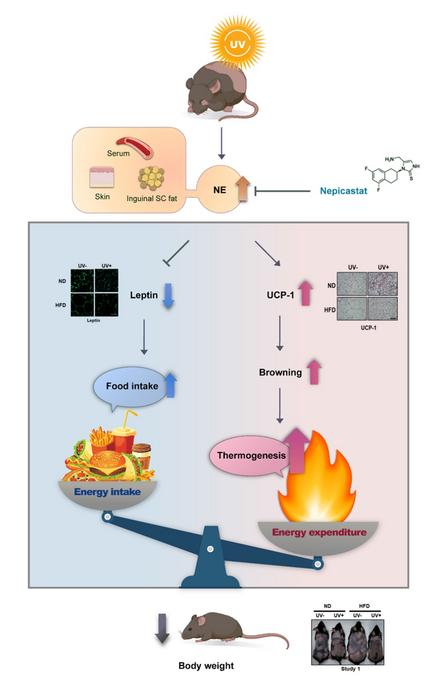UV exposure raises norepinephrine levels, decreases leptin levels, and induces the browning of subcutaneous fat, thereby increasing energy expenditure, new research suggests.
These results, which appear in the Journal of Investigative Dermatology, may help pave the way for new approaches to prevent and treat obesity and metabolic disorders.
“Because UV exposure can accelerate skin aging and promote skin cancer, it is advisable to minimize UV exposure and protect the skin with sunscreen. Thus, our research team plans to conduct follow-up studies to develop new strategies that could mimic the effects of UV radiation for obesity and metabolic regulation.”
Dong Hun Lee, MD, PhD
Investigators discovered that when exposed to UV radiation consistently, mice fed a normal diet and those on a high-fat diet exhibited increased appetite due to a decrease in leptin. However, there was no weight increase. They found that UV radiation inhibits weight gain by enhancing secretion of the neurotransmitter norepinephrine, which not only decreases leptin but also increases energy expenditure through the “browning” of subcutaneous fat.
The increased energy intake, driven by heightened appetite, is converted to heat and burned before it can accumulate in subcutaneous fat, thus preventing weight gain.
“This study elucidates the mechanism by which UV exposure can increase appetite while inhibiting weight gain,” says lead investigator Jin Ho Chung, MD, PhD, Department of Dermatology, Seoul National University Hospital and Seoul National University College of Medicine in South Korea, in a news release. “These findings contribute significantly to understanding the effects of UV radiation on energy metabolism and homeostasis and open new avenues for exploring prevention and treatment strategies for obesity and metabolic disorders. Notably, the fact that UV radiation lowers leptin levels and increases norepinephrine, thereby promoting the browning of subcutaneous fat and increasing energy expenditure, provides a groundbreaking clue for the development of obesity treatment strategies.”
This research demonstrates that “UV exposure not only affects the skin but also plays a deep role in our body’s energy metabolism and homeostasis processes, Dr. Chung says. “However, further research is needed on the long-term effects and safety of UV exposure, and there should be significant interest in developing new therapeutic approaches that utilize the efficacy of UV radiation.”
Co-corresponding author Dong Hun Lee, MD, PhD, Institute of Human-Environment Interface Biology, Seoul National University, notes, “Because UV exposure can accelerate skin aging and promote skin cancer, it is advisable to minimize UV exposure and protect the skin with sunscreen. Thus, our research team plans to conduct follow-up studies to develop new strategies that could mimic the effects of UV radiation for obesity and metabolic regulation.”
PHOTO CAPTION: The radiation enhances norepinephrine secretion, which not only decreases leptin thereby increasing food intake, but also increases energy expenditure through the browning of subcutaneous fat.
PHOTO CREDIT: Journal of Investigative Dermatology


